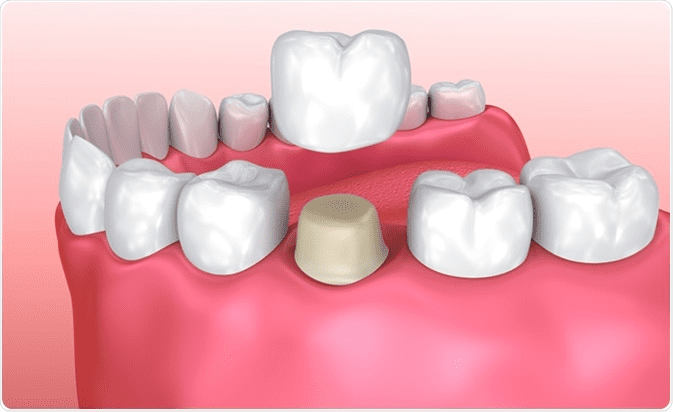What Are Dental Crowns?
Dental crowns, also known as tooth caps or restorative crowns, are custom-made prosthetic devices designed to cover and protect damaged teeth. They serve both functional and aesthetic purposes, restoring the natural shape, size, and strength of a tooth while enhancing its appearance. Made from various materials such as porcelain, ceramic, metal alloys, or zirconium dioxide, these restorations can be tailored to match the color and texture of surrounding teeth for a seamless look.
The process of obtaining a dental cap typically begins with an examination by Dr. Ciancarelli, who will assess the condition of the affected tooth. This may involve taking dental impressions and X-rays to ensure that the crown fits properly and functions effectively within the mouth. Once the necessary information is gathered, a temporary tooth crown may be placed until the permanent restoration is ready.
Crowns are often recommended in cases where a tooth has undergone significant wear, decay, or trauma. Dental Crowns provide essential support and protection, helping patients maintain their oral health and function without discomfort. With advancements in dentistry, same-day crowns have become increasingly popular, allowing patients to receive immediate treatment without multiple visits to the dental office.
What Problems Do Dental Caps Solve?
These restorative solutions address several common dental issues. For instance, they can effectively repair cracked or fractured teeth, providing stability and preventing further damage. In addition, dental caps are frequently used after root canal therapy to restore the structure of a tooth that has been weakened due to infection or extensive decay.
Another problem that crowns help solve is tooth discoloration. Many individuals experience changes in the color of their teeth due to factors like aging, diet, or poor oral hygiene. By placing a porcelain crown over a discolored tooth, patients can achieve a brighter, more uniform smile.
Furthermore, dental caps play a crucial role in protecting vulnerable teeth from bacteria and plaque buildup, which can lead to periodontal disease if not managed properly. By covering the tooth, crowns create a barrier against harmful substances, promoting better oral hygiene and overall health.
What’s Involved in Getting Tooth Crowns?
The journey to receiving a dental crown typically involves multiple steps. Initially, patients will consult with Dr. Ciancarelli to discuss their specific needs and determine whether a crown is the right solution. During this appointment, a thorough examination will take place, including digital imaging and possibly a dental impression to create a precise mold of the patient’s mouth.
Once the assessment is complete, the next step involves preparing the tooth for the crown. This preparation may require removing any decayed material and shaping the remaining tooth structure to accommodate the new restoration. Afterward, a temporary crown is placed to protect the prepared tooth while the permanent crown is crafted in a dental laboratory.
After a few weeks, when the final product is ready, patients return to the office for placement. The dentist will carefully fit the crown onto the tooth, ensuring it aligns correctly with neighboring teeth and does not interfere with biting or chewing. Finally, dental cement is used to secure the crown in place permanently, completing the restoration process.
Who Are Dental Caps For?
Dental crowns are suitable for a wide range of patients facing various dental challenges. Individuals suffering from severe tooth decay, cracks, or fractures can benefit significantly from this type of restoration. Additionally, those who have undergone root canal therapy often require a crown to restore the tooth’s integrity and functionality.
Moreover, dental caps can be ideal for individuals looking to enhance their smiles. Patients with discolored or misshapen teeth may find that crowns offer an effective way to improve aesthetics while maintaining proper oral health. Furthermore, people experiencing bruxism, or teeth grinding, may need crowns to protect their teeth from excessive wear and tear.
Ultimately, anyone seeking a long-lasting solution to dental problems should consider consulting with Dr. Ciancarelli about the possibility of using restorative crowns as part of their treatment plan. A personalized approach ensures each patient receives care tailored to their unique circumstances.
What Are the Benefits of Restorative Crowns?
The advantages of dental caps extend beyond mere aesthetics. One of the primary benefits is their ability to strengthen and protect compromised teeth, thereby reducing the risk of future dental issues. By encasing a damaged tooth, crowns help preserve its structure and prevent further decay or fracture.
Additionally, crowns contribute to improved oral function. Patients can enjoy eating and speaking without discomfort, as the caps restore normal bite alignment and chewing efficiency. This enhancement in daily activities can significantly impact one’s quality of life.
Another noteworthy benefit is the longevity of crowns. When properly cared for through regular brushing, flossing, and routine dental check-ups, restorative crowns can last many years, making them a cost-effective option in the long run. Moreover, advancements in materials such as lithium disilicate and zirconia have led to durable and aesthetically pleasing options that blend seamlessly with natural teeth.
Why Is Long Island Beautiful Smiles Uniquely Qualified to Provide Dental Caps?
Long Island Beautiful Smiles stands out as a premier provider of restorative dentistry services, particularly in the realm of dental caps. Led by Dr. Ciancarelli, the practice emphasizes individualized care tailored to meet the specific needs of each patient. This family-oriented approach fosters a welcoming environment where patients feel comfortable discussing their concerns and desires regarding their oral health.
Dr. Ciancarelli brings extensive knowledge and expertise to the field of restorative dentistry, utilizing advanced techniques and state-of-the-art technology to deliver exceptional results. The practice prioritizes ongoing education and training, ensuring that all staff members stay informed about the latest developments in dental materials and procedures.
In addition to technical proficiency, Long Island Beautiful Smiles places a strong emphasis on patient comfort and satisfaction. From the initial consultation to follow-up appointments, every aspect of the experience is designed to promote a positive outcome. Whether searching for affordable dental crowns near me or the best crown dentist near me, patients can trust that they will receive top-notch care at Long Island Beautiful Smiles.
Your Path to a Healthier Smile Starts Here
If you’re considering dental crowns near me, look no further than Long Island Beautiful Smiles. Dr. Ciancarelli and the dedicated team are here to guide you through your journey toward a healthier, more beautiful smile. Call today at (516) 825-0649 or visit our contact page. You can also find us on Google Maps at this link. Don’t wait—take the first step toward restoring your smile with dental crowns!






